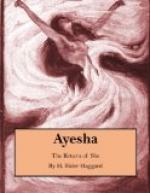“The end of it was that, driven to it by her questions and to stop that sort of thing, I told her that I was looking for my wife, whom I had lost, for, after all, Ayesha is my wife, Horace. She smiled and suggested that I need not look far; in short, that the lost wife was already found—in herself, who had come to save me from death in the river. Indeed, she spoke with such conviction that I grew sure that she was not merely amusing herself, and felt very much inclined to believe her, for, after all, Ayesha may be changed now.
“Then while I was at my wits’ end I remembered the lock of hair—all that remains to us of her,” and Leo touched his breast. “I drew it out and compared it with the Khania’s, and at the sight of it she became quite different, jealous, I suppose, for it is longer than hers, and not in the least like.
“Horace, I tell you that the touch of that lock of hair—for she did touch it—appeared to act upon her nature like nitric acid upon sham gold. It turned it black; all the bad in her came out. In her anger her voice sounded coarse; yes, she grew almost vulgar, and, as you know, when Ayesha was in a rage she might be wicked as we understand it, and was certainly terrible, but she was never either coarse or vulgar, any more than lightning is.
“Well, from that moment I was sure that whoever this Khania may be, she had nothing to do with Ayesha; they are so different that they never could have been the same—like the hair. So I lay quiet and let her talk, and coax, and threaten on, until at length she drew herself up and marched from the room, and I heard her lock the door behind her. That’s all I have to tell you, and quite enough too, for I don’t think that the Khania has done with me, and, to say the truth, I am afraid of her.”
“Yes,” I said, “quite enough. Now sit still, and don’t start or talk loud, for that steersman is probably a spy, and I can feel old Simbri’s eyes fixed upon our backs. Don’t interrupt either, for our time alone may be short.”
Then I set to work and told him everything I knew, while he listened in blank astonishment.
“Great Heavens! what a tale,” he exclaimed as I finished. “Now, who is this Hesea who sent the letter from the Mountain? And who, who is the Khania?”
“Who does your instinct tell you that she is, Leo?”
“Amenartas?” he whispered doubtfully. “The woman who wrote the Sherd, whom Ayesha said was the Egyptian princess—my wife two thousand years ago? Amenartas re-born?”
I nodded. “I think so. Why not? As I have told you again and again, I have always been certain of one thing, that if we were allowed to see the next act of the piece, we should find Amenartas, or rather the spirit of Amenartas, playing a leading part in it; you will remember I wrote as much in that record.
“If the old Buddhist monk Kou-en could remember his past, as thousands of them swear that they do, and be sure of his identity continued from that past, why should not this woman, with so much at stake, helped as she is by the wizardry of the Shaman, her uncle, faintly remember hers?




